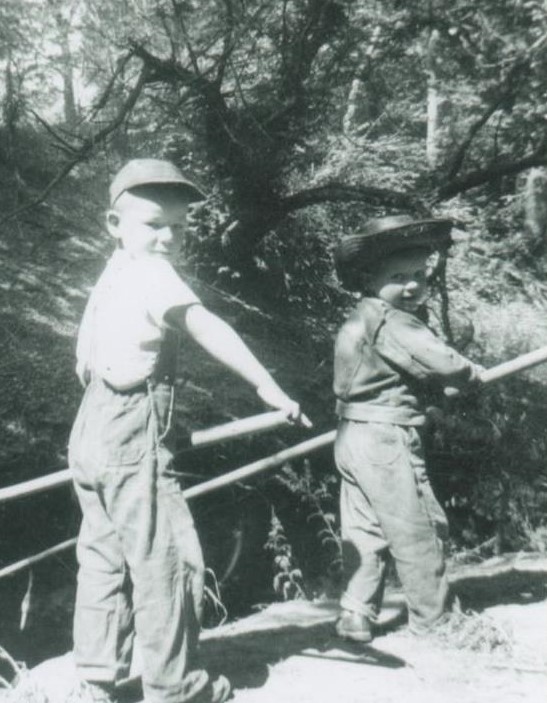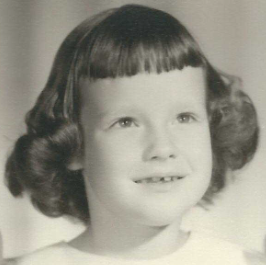When I was a small girl, my home had many Christian influences. The biggest influence was Christian music. Though I know my parents did not have much, they did buy records, both long-play for adults and small records for children. Hearing about Jesus through the records greatly influenced my belief in Him. My dad also read to us from the Bible and led in prayer. I’d written the date 1959 in the front of my Bible as to when I became saved, but I think it was earlier than that. It was not at home, but through a conversation with a Sunday School teacher, that I took the step to ask Jesus Christ into my life.
Our family was faithful in attending church where my sisters and I sang in the Children’s Choir and attended Sunday School. We also attended a “church school” in our neighborhood. Arnold Epp was the pastor in my growing-up years. His teaching added to my understanding of the Bible and of the gospel. In preparation for baptism, Rev. Epp chose this verse for me to ponder:
If you have died with Christ to the elementary principles of the world, why, as if you were living in the world, do you submit yourself to decrees…. Colossians 2:20.
I believe Rev. Epp was warning me not to be caught up in legalism, that is, in rules like, don’t go to movies, pool halls, or dances. That was certainly how many in those days thought we should act. So, instead of following “religion” or relying on good works to be saved, Rev. Epp was pointing to Scripture which instructs me to focus on Jesus and live out the truths of the Bible. It reminds me how, a few years later, as a college dorm assistant, I was asked to measure the length of girls’ skirts and to give infraction slips to those wearing skirts that were too short! Thankfully, further study of the Bible and knowing God more would lead me away from rule-following to learning what it means to be a true Christ-follower.
My parents found a way to send my sisters and me to a Bible college, at least for one semester. While working part-time, I was privileged to hear the Word taught there for four full years. Right out of college, I became a part of a young adult Bible study and had roommates in this study. Some of us sang together in church. A few years later, I met my husband at the place where we both worked…Back to the Bible Broadcast in Lincoln, Nebraska.
My husband (Tom Loof) and I are so grateful that, through the years, God led us to churches where the Bible has been taught clearly, even verse by verse. And each of our daughters professed to come to Christ from the hearing of the Word.
One of my high school Sunday School teachers had a phrase he’d repeat that stuck in my mind. He said, “Life is real, life is earnest.” Besides being about taking life seriously, those words had another meaning for me. You see, I knew, growing up, that my dad was a Christian. He led by example with a godly life, he taught children in a Sunday School class, and he sang for many years with his brothers in a gospel quartet. But it seemed to me, that he could not talk to me about spiritual things, or about other important topics. It’s what Uncle Otto said in his testimony…being a Christian in their family back then was more of a private matter. Because of the hunger to talk to my dad about things that mattered, I resolved to be even more open in future conversations with my own family. I continue to ask God for the courage to share the Gospel with them and to pass on my faith to the next generations.
We will not hide these truths from our children; we will tell the next generation about the glorious deeds of the LORD, about his power and his mighty wonders. Psalm 78:4
I have no greater joy than to hear that my children are walking in the truth. 3 John 1:4
God has been and is faithful; His faithfulness is a continuous thread throughout my life. Physical ailments started when I was a junior in high school; a hemorrhage kept me home for a couple of months. Before our oldest daughter was born, the headaches and feeling “off-balanced” started. This continued for several years until an MRI revealed a tumor on my pituitary gland. God watched over us and enabled me to take care of what was then all three of our daughters. After a move to Arizona and seeing new doctors, the headaches lessened. I taught school for over 18 years. During the last few years of teaching, the headaches and feeling “off-balanced” began again. Vertigo occurred after plane trips. Again, God was faithful. I knew it was God’s will for me to be alive when I woke each new morning, so I told Him that I would live with the amount of strength that He would give for that day.
And He said to me, ‘My grace is sufficient for you, for power is perfected in weakness.’ Most gladly, therefore, I will rather boast about my weaknesses, that the power of Christ may dwell in me. 2 Corinthians 12:9, 10.
Though I nor the doctors knew what was going on in my body, God knew:
For He Himself knows our frame; He is mindful that we are but dust. Psalm 103:14
(This verse may also be about our weakness as sinful people.)
I love the story about God giving timely strength that Corrie Ten Boom tells in her book, The Hiding Place: The Triumphant True Story of Corrie Ten Boom:
“Father sat down on the edge of the narrow bed. ‘Corrie,’ he began gently, ‘when you and I go to Amsterdam—when do I give you your ticket?’ I sniffed a few times, considering this. ‘Why, just before we get on the train.’ ‘Exactly. And our wise Father in heaven knows when we’re going to need things, too. Don’t run out ahead of Him, Corrie. When the time comes that some of us will have to die, you will look into your heart and find the strength you need—just in time.’”
After my retirement, a few things became clearer. I had developed TMJ (jaw and facial pain) because of clenching my teeth while driving and at night. Some hormonal issues needed to be resolved. And Mayo doctors gave me Botox injections and an antidepressant. For a season, the headaches faded some. Today, my husband does the driving, and a neurologist is searching for the right combination of medications for my head pain. I am confident that my struggles have a purpose, one of which is being able to encourage others in pain.
Blessed be the God and Father of our Lord Jesus Christ, the Father of mercies and God of all comfort; who comforts us in all our affliction so that we may be able to comfort those who are in any affliction with the comfort with which we ourselves are comforted by God. 2 Corinthians 1:3, 4
This I recall to my mind, therefore I have hope. The Lord’s lovingkindnesses indeed never cease, for His compassions never fail. They are new every morning; great is Thy faithfulness. Lamentations 3:21, 22.
I am so glad Jesus is the real deal! I knew at a young age that I was sinful and fell short in so many ways. Though I lived in a “Christian” family, I had to believe in Christ for myself. It’s overwhelming for me to know how much He loved me, suffered a terrible death on the cross, and rose again to pay for and secure my salvation.
Who, although He (Jesus Christ) existed in the form of God, did not regard equality with God a thing to be grasped, but emptied Himself, taking the form of a bond-servant, and being made in the likeness of men. And being found in appearance as a man, He humbled Himself by becoming obedient to the point of death, even death on a cross. Philippians 2: 6-8.
For while we were still helpless, at the right time, Christ died for the ungodly. But God demonstrates His own love toward us, in that while we were yet sinners, Christ died for us. Romans 5:6, 8.
As a follower of Christ, I desire to know Him more and to live so that I am pleasing to Him.
I count all things to be loss in view of the surpassing value of knowing Christ my Lord…and be found in Him, not having a righteousness of my own derived from the Law, but that which is through faith in Christ, the righteousness which comes from God on the basis of faith. Philippians 3:8, 9
I am assured that He will continue to work in me, in all kinds of circumstances.
For I am confident of this very thing, that He who began a good work in you will complete it until the day of Christ Jesus. Philippians 1:6.
Remember, how God used music to draw me to Him? I still love hearing and singing music about Him! My daughters will attest that I constantly sang to them in the car. Through the years I so enjoyed singing in different choirs. God sometimes awakens me in the morning with a song!
Because Thy lovingkindness is better than life, my lips will praise Thee, so I will bless Thee as long as I live; I will lift up my hands in Thy name. Psalm 63:3, 4.



